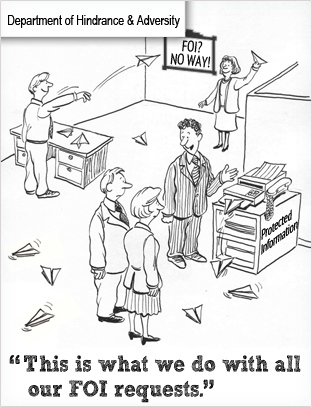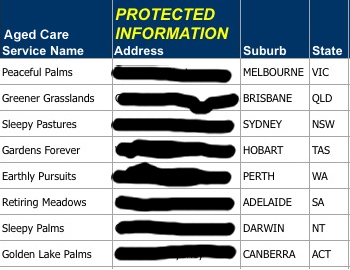The Department of Health and Ageing (DOHA) has a reputation for being secretive and obstructive. Aged Care Crisis’s (ACC) experience defied belief. It shows just how difficult it is to get any type of information in aged care.
ACC asked DOHA for the addresses of all facilities providing aged care. They needed the information to help those who approach them for guidance to find the facilities nearest to them. We did not anticipate that it would take an FOI, let alone appealed, to supply such basic information.
After some nagging by ACC, we received a response refusing the request on the grounds that addresses were "Protected Information" under the Aged Care Act 1997 (Act). ACC examined the Act and it was clear that this was not the case. DOHA did not respond to a request for clarification.
A politician kindly offered to help ACC get the information, but he too was refused. The addresses were only released after the politician appealed the decision.
Background to our request for information
 Citizens and particularly the press have found that getting simple basic information out of DOHA is like squeezing blood out of a stone.
Citizens and particularly the press have found that getting simple basic information out of DOHA is like squeezing blood out of a stone.
They must think they have some dark secret to hide and are terrified of giving any clues. But it's not a dark secret at all. Aged care is broken and, as Lateline revealed on 23 August 2013 (and earlier reports), many of Australia's frail elderly are being neglected and suffer needlessly during the last months of their lives.
ACC's experience in trying to get something as simple as the addresses of the facilities that offer to care for Australia's oldest and most frail citizens must win the prize for obstructive bureaucracy.
ACC frequently receives requests from families for assistance with help in locating a range of suitable aged care services. ACC volunteers assist families by providing a list of facilities with street addresses in their localities. To do so, they need a master list from which local information is readily extracted.
Whilst some information ACC draws on is published in electronic format on the Department of Health and Ageing's website, the list excludes the "address" column of information which we were seeking. DOHA's website offers to supply additional information if needed. Our experience showed that this was an empty offer.
This is what happened when we asked for the addresses of Government funded aged care facilities in electronic format from DOHA.
24 June, 2013: Initial email request to DOHA: Aged Care Crisis emailed DOHA's Aged Care Data section, requesting the Services List in electronic format for aged care services in Australia, with the inclusion of the street address of each listed service. We asked if our email could be acknowledged within seven days of receipt. This did not occur.
1 July, 2013: Follow up email to DOHA: We sent a courtesy follow up email and asked if DOHA could confirm receipt within seven days - in case our email had gone astray. We again, asked for written confirmation. This did not occur.
2 July, 2013: We rang DOHA: We rang and spoke to staff in the Department's Aged Care Data section and were told why DOHA was unable to comply with our request. We asked that DOHA provide the reason for this in writing.
3 July, 2013: DOHA responds: The written response confirmed the phone call explaining why DOHA would not comply. DOHA's reply claimed that Government funded aged care facility locations were classified as "Protected Information" under the Act, but, DOHA had already published the information we were after on their website!
"… Address information of Aged Care Services is classified as Protected Information under the Aged Care Act 1997.
The Secretary of the Department of Health and Ageing has the power to disclose Protected Information and the Secretary has chosen to use those powers to make this information available through the My Aged Care website…"
This response illustrates the length to which DOHA will go to frustrate those who might expose its deficiencies and brief the public when it fails to do so. Many others have also publicly commented on this. Imagine if this same restriction were applied to other organisations that provide services for the community - for example, schools, hospitals or child-care centres.
17 July, 2013: Aged Care crisis responds to the Department
Aged Care Crisis challenged DOHA's response by asking them if they could specify what part of the Aged Care Act 1997 the "Protected Information" provision falls under. DOHA did not respond:
In your response to my email dated 3 July 2013, you said:
"Address information of Government funded Aged Care Services is classified as 'Protected Information' under the Aged Care Act 1997."
'Protected Information' under the Aged Care Act 1997 is defined as:
Division 86 Protection of information - 86-1 Meaning of protected information
In this Part, protected information is information that:
(a) was acquired under or for the purposes of this Act; and
(b) either:
(i) is *personal information; or
(ii) relates to the affairs of an approved provider; or
(iii) relates to the affairs of an applicant for approval under Part 2.1; or
(iv) relates to the affairs of an applicant for a grant under Chapter 5.
Can you please specify which of the alternatives is relied upon in declaring that the address of Government funded Aged Care Services are 'Protected Information'?
Service lists published on DOHA's website prior to 2008 included street addresses. We could not understand why this had changed, particularly as there was no information in the Aged Care Act 1997 indicating otherwise.
Family First's, Rikki Lambert, (from MLC Robert Brokenshire's office) helped by requesting the same set of information via FOI. When refused, he appealed the decision. DOHA finally gave in and supplied the information.
DOHA's bloody-minded resistance to a simple request for information, so well illustrated here, is consistent with our experience, as well as that of many family members who contact us.
It should not be this difficult to get this sort of information!

Update - 6 September 2013
In a last gasp attempt of resistance, DOHA published the data we were seeking on their FOI disclosure log in PDF format, split between two documents, both documents nearly 45 Megabytes to download. This, despite the fact that DOHA had already supplied the same information in MS Excel spreadsheet (machine readable) format.
Such responses are now out of alignment with the Commonwealth Government’s strategy for moving from paper-based records management to digital information and records management, in its Digital Transition policy, which will see all government information and records created, managed and stored in digital form by 2015.
The FOI Act has been in place for 30 years, yet the intent of the law is still being constrained by the culture of government agencies which are risk-averse and inherently biased towards concealment of government information. Significant attention to culture change is required to encourage disclosure and optimise opportunities for proactive disclosure.
Compared to... United Kingdom: Care Quality Commission (CQC)
The Care Quality Commission in the UK is the organisation that checks hospitals, care homes and care services that are meeting government standards. The CQC website publishes all of their inspection reports - including unannounced visits, with substantial focus of the CQC reporting based on "What people who use the service experienced and told us" recorded in all of their reports, as well as the inspector's independent assessment notes.
The website is targeted specifically for consumers wanting to make informed decisions for placement of loved ones in care homes in UK, and also provides information such as a snapshot of the ownership or company structure and other services run by the same provider or company. They also publish the name of the person or management responsible at the facility level (and company level).
Depending on the type of report (all visits or contact reports are published, regardless of visit type), it also details the improvement actions and concerns about the facility (equivalent to the NRA's – Notices of Required Actions issued to Australian aged care providers). If a "Review" of a service is performed – what triggered the review is documented in the report, as well as how the review was carried out, including family's feedback and experiences (eg, complaint, result of spot check, etc).
The CQC also publish and make available in electronic format, a substantial amount of information - their approach is: "We want to be as open and transparent as we can be with the information we collect, analyse and store". Indeed they do.
Consider the contrast in Australia, that it took an appealed FOI request to obtain in electronic format, the street addresses of government funded facilities in Australia!


